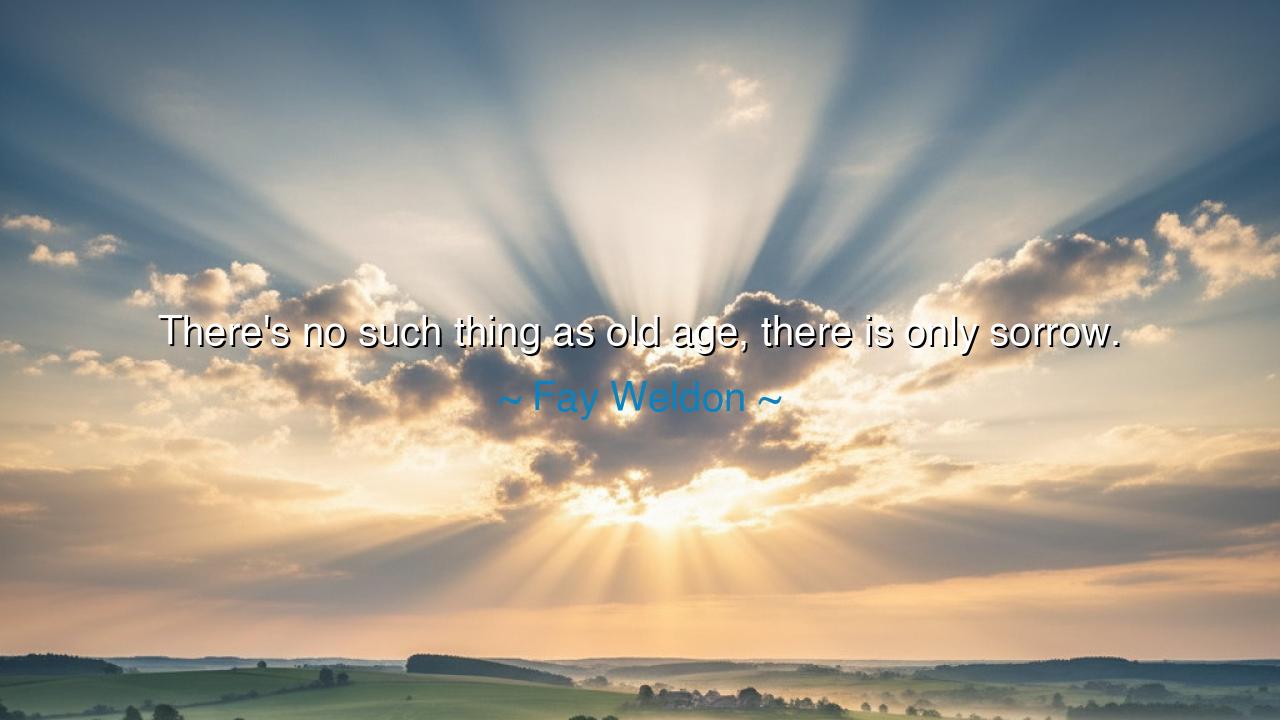
There's no such thing as old age, there is only sorrow.






"There's no such thing as old age, there is only sorrow." - Fay Weldon. With these striking words, Weldon challenges the conventional understanding of aging and invites us to reconsider the way we perceive the passage of time. In this declaration, she suggests that old age is not merely a biological stage of life but a mental construct, one often marked by the sorrow of loss—loss of health, vitality, and perhaps even identity. Sorrow, in Weldon’s view, is the true shadow that falls across the years, a grief for what has passed and what can never be reclaimed. Yet, this sorrow is not an inevitable companion; it is a result of how we choose to view the decline of the body and the changes that come with age.
Consider the life of Robert Frost, the poet who, even in his later years, continued to write with the vigor and insight of a much younger man. Though his body aged, his mind remained sharp, continually crafting verses that explored the depths of human existence. Yet, Frost also felt the deep sorrow of loss—the loss of loved ones, the diminishing of his physical strength, and the awareness that his time on earth was waning. In his poetry, he frequently returned to themes of age, but he did not view it as a mere decline. Rather, he used the sorrow of aging as a means of reflection, a way of connecting with the inevitable changes that shape the human journey. Frost’s life reminds us that sorrow is not the absence of life, but a natural part of the cycle that must be embraced.
Weldon’s perspective also speaks to the emotional toll that aging can take on the soul. As our bodies slow and our lives change, there often comes a deep grief—sorrow not only for the physical losses but for the parts of ourselves we feel slipping away. Many experience this grief as the loss of youth, of physical vitality, or even the loss of roles and responsibilities that once defined us. But is this truly the sorrow of age, or is it the sorrow of attachment? The sorrow of fearing the end of self as we once knew it? It is not the years that bring sorrow, but the way we cling to the identity we held in youth.
Take the story of Mahatma Gandhi, who, in his later years, carried the weight of wisdom, but also the deep sorrow of witnessing the pain and division in his country. Though Gandhi's body weakened with age, his spirit remained unbroken, and his sorrow was not for himself but for the suffering of others. He embodied the idea that age is not simply a decline, but an opportunity to use the sorrow we feel to shape the world with compassion and service. Gandhi found strength in his sorrow, and through it, he contributed to the legacy of peace and unity that transcended his physical limitations.
However, Weldon’s assertion that “there is only sorrow” does not suggest that aging is without its grace or beauty. It is a recognition of the human condition—that as we age, we become more aware of the fragility of life. The sorrow comes not from age itself, but from the attachment to what was, and the grief of letting go. In this context, old age is a natural stage of life, yet the sorrow of this stage is not a tragedy but a reminder to live deeply and appreciate what remains. It is through sorrow that we find depth, and it is in embracing this sorrow that we begin to see life’s true beauty—not in the avoidance of loss, but in the courage to face it.
Thus, the practical lesson here is that we must not fear sorrow. As we age, we will inevitably encounter loss—of youth, of health, and perhaps of loved ones. But sorrow does not diminish us; it can enrich us, allowing us to live with greater authenticity, compassion, and wisdom. Let sorrow be not a weight that drags us down, but a force that shapes us, a reminder to live fully and love deeply, even as time marches forward.
The lesson, then, is to accept sorrow as a companion in aging, but do not let it define you. Find strength in it, just as the great figures of history did. Embrace the changes that come with age—not as something to mourn, but as a passage to be honored. Live with courage, for sorrow is but a fleeting shadow, and it is through embracing it that we find the deepest truths of life. Aging is not a curse, but an opportunity to live more fully than ever before, enriched by the wisdom that comes with the passing of time.






AAdministratorAdministrator
Welcome, honored guests. Please leave a comment, we will respond soon